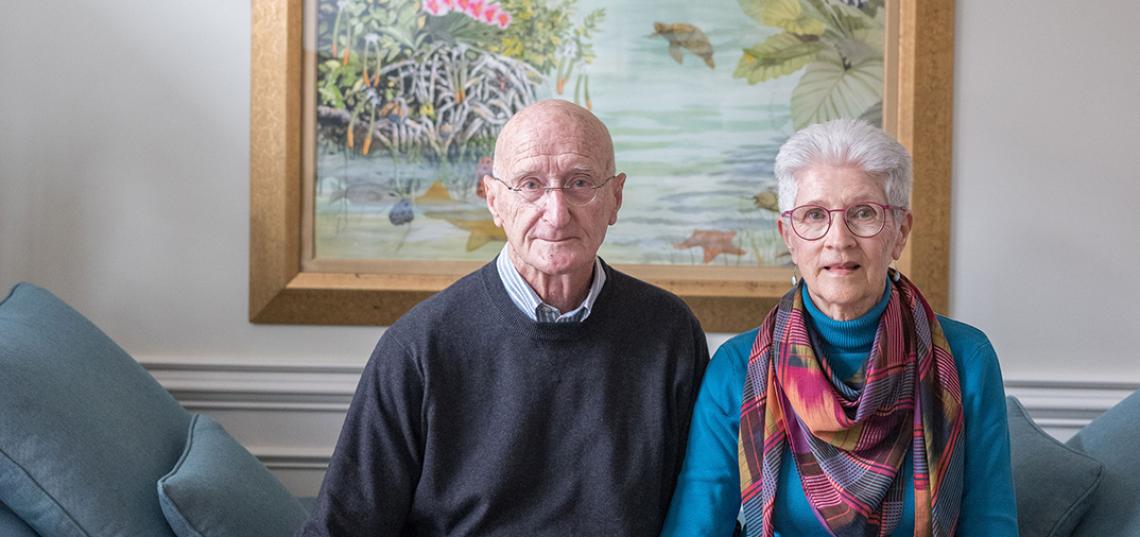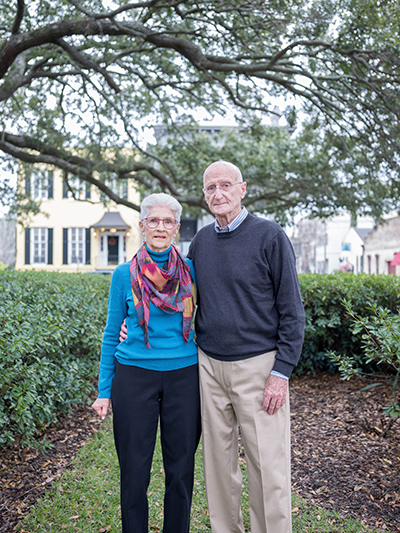
During his undergraduate years at Rutgers, Frank Kabela, Jr. ’60, a media executive who spent over twenty years at Greater Media, retiring in 2000 as chairman and chief executive officer, took full advantage of the many academic and extracurricular opportunities Rutgers offered, and he credits his Rutgers education and experience with his success.
Majoring in Journalism at the Rutgers School of Communication and Information (SC&I), he wrote for the Daily Targum and was elected President of Targum Council and member of the Freshman Council. He was secretary of Scarlet Key, junior editor of the Scarlet Letter, vice president of the Journalism Society, member of the AFROTC competitive drill team (Queen’s Guard) and a member of the local chapter of the National Student Association. As a senior, he was elected president of his fraternity, Sigma Phi Epsilon. He met his future wife, Pat Bors, a Douglass student, at a fraternity event.
Today, Frank and Pat Kabela of Savannah Ga., have been married for 58 years, have two grown children, and are dedicated to giving back to Rutgers. By recently pledging a seven-figure gift to the Rutgers Future Scholar’s Program, they are ensuring that other students will benefit from a Rutgers education as they have.
Frank, who is listed as a “noteworthy broadcast executive” by Marquis Who’s Who, leveraged his Rutgers education to pursue a successful career in journalism. Pat volunteered for 15 years at a social services preschool, for which she was honored, and she also worked as an ESL tutor while they lived in Key West, Florida, before they moved to Georgia.
Looking back on the reasons they chose to attend Rutgers, Frank and Pat both said “being from families of limited means” impacted their decisions. Frank said he chose Rutgers because he won a full scholarship to the university by being the sole winner of a state Foreign Language Teachers Association competitive exam. Pat had hoped to attend college elsewhere, but she came to Rutgers because it made the most financial sense. She attended Douglass for two years, commuting from home, then left Rutgers to work full-time at Johnson & Johnson.
Frank said studying journalism ended up being a great decision, although he said he didn’t arrive at Rutgers with that major in mind, and even after graduation, he wasn’t sure he wanted to pursue journalism professionally. Frank said he also considered the law, but “the best decision I made was to be a no-show on what would have been my first day at Georgetown Law School and to stick with journalism and my job then at The Record in Hackensack. (There are more than enough lawyers!).”
“Majoring in Journalism changed my life completely,” Frank said. “I entered RU with no particular career ambition other than ‘something to do with business,’ but one Accounting course put an end to that. By junior year I had to declare a major, and my friend and classmate Dick Sandler, already a dedicated and experienced newsman, urged me to give journalism a try. (Dick sadly died at age 50 while Sports Editor of Newsday on Long Island). By senior year, Dick was Editor of Targum and I was elected President of the Targum Council. The one professor I remember most fondly was the late Kenneth Q. Jennings, who taught newswriting and editing. His passion for the business was contagious.”
Explaining the direct link between majoring in journalism and his career, Kabela said, “My RU journalism background helped me succeed in many different facets of the media business. I owned two advertising agencies (Princeton Partners, Inc. in New Jersey and The Kabela Company in Phoenix Arizona), I was a daily newspaper reporter for The Record in Bergen County and editor, publisher, and general manager of The Sentinel community newspaper group in Middlesex County. I worked in public relations for Johnson & Johnson for a year after I got out of the Army, and the last 20 years of my career I worked for Greater Media, Inc., which was at the time one of the country’s largest privately-held owners of major market radio stations, cable television systems, and community newspapers.”

Photo credit: Kelli Boyd Photography
During the course of his extremely successful career, Frank said some of the most interesting projects he worked on were at Greater Media. These included, he said, “negotiating with high-profile radio personalities like Howard Stern (a gentleman, by the way), Don Imus (not so much) and Wolfman Jack and being part of the dynamic and often-cut-throat competition among radio stations in markets like Los Angeles, Boston, Philadelphia, and others. Probably my biggest and riskiest decision was to pay Howard Stern several million dollars a year just to run tapes of his east coast broadcasts a few hours later in LA. (That paid off nicely, by the way).”
Throughout his career in the media industry, Frank saw many dramatic changes take place in the journalism field. Asked to describe the ways he thinks journalism has changed the most since the 1960s, he said, “Oh boy, is there another industry that has changed more dramatically than the media? I’m an avid newspaper reader but I read the online editions of the three daily papers to which I subscribe. Radio is in decline due not only to new internet-based services, satellite radio, podcasting, etc. but also to the unwise deregulation of radio ownership which saw an ownership limit of 14 stations grow to virtually no limit at all with single radio companies today owning hundreds and even thousands of stations and often programming homogenized, centralized content nationwide. Cable TV is in the hands of a few big owners, as well, and they, too, are scrambling to beat the new streaming competition. And, sadly, newspapers die every day.
“I had a recent experience which brought home one big change. I was touring the journalism school at Savannah State University, the local HBCU which Pat and I have assisted with annual gifts and a bequest. On each classroom desk was a huge monitor and keyboard, and I couldn’t help but recall our journalism classrooms in Van Nest Hall where each desk bore a big, black ‘40s era L.C. Smith-Corona typewriter.”
As a witness to the many changes in television programming over the years, Frank said, “Being in on the infancy of cable TV was fascinating. When we built our first systems in Massachusetts the challenge was to get people to pay $9.95 a month for 13 channels and another $5 for HBO (that’s all we had to offer), and I think of that each month when I pay my $200+ Comcast bill. Years later the challenge was to build the cable system to serve Center City and South Philadelphia, where the area under the streets was so crowded with conduits, pipes and other ancient infrastructure that we had to install the cable (very carefully!) under the historic brick sidewalks.”
While serving in the U.S. Army, Frank was trained in a very different kind of ‘communications.’ He said, “Between the Korean and Vietnam wars, the Army offered draft-eligible men the option of serving six months active duty and six years of National Guard or Reserve service. I took them up on the offer. As new enlistees at Fort Dix we were asked about our civilian occupations in order to be placed in related military specialties if possible. I told the clerk I was a newspaper reporter. He leafed through a huge book (no computers!) and said the Army didn’t have that. I tried ‘Journalist.’ No go. ‘Communications?’ Bingo, that was my specialty, and that’s how I wound up in a totally different kind of communications school where I learned, among other things, how to climb telephone poles and operate a switchboard. After basic and specialty training, I was assigned as an instructor in the communication school, so my full tour of active duty was close to home at Fort Dix.”
Over the years, Frank and Pat Kabela have made a significant impact on the places they’ve worked and volunteered, and they have also profoundly benefitted various organizations through their philanthropy. While they have supported local arts and culture groups, and organizations such as the ACLU and SPLC, the Kabelas said they are most passionate about education, and are particularly dedicated to supporting students who are underserved by today’s educational system.
Through their generous gift to the Rutgers Future Scholars Program, they are assisting the program achieve its mission to provide 200 first-generation, low-income, academically promising middle school students from New Brunswick, Piscataway, Newark, Camden and Rahway the chance to earn a full scholarship to Rutgers, The State University of New Jersey.
“Looking back on our lives, we recognize how fortunate we have been and that we have been helped along the way by others. Now it’s our turn to help where we can,” Frank and Pat said.
Through the Rutgers Future Scholars Program, selected students become part of a “pre-college culture of university programming, events, support, and mentoring” which begins the summer before their eighth grade year and continues through high school and college.
Rutgers Future Scholar Piney Arp, an undergraduate at the School of Communication and Information, said, "I have benefitted from the Rutgers Future Scholar's Program since I was 13, when I was just beginning eighth grade. Now, as a senior at Rutgers, I am pursuing my dream to become a journalist. I am extremely grateful to the program for helping me succeed on both my education and career paths.”
Thanking the Kabelas for their support, Aramis Gutierrez, director of the Rutgers Future Scholars Program wrote, “One of my former mentors was fond of saying that the greatest act of philanthropy is giving to those whom you will never meet. By providing so generously for the Rutgers Future Scholars in your estate, you are doing just that, and scores, if not hundreds, of future students will be able to fulfill their dream of obtaining a degree in higher education as a result.”
Through their pledge, the Kabelas hope to help enable students to take full advantage of this very special opportunity offered them by Rutgers, and it is their wish to “see these Future Scholars thrive, get a college education and go on to happy, productive lives.”
Asked for advice he would give to future and current Rutgers students, Frank said, “Obviously make the most of your academic opportunities, but grab every chance to network and learn beyond the classroom. Volunteer service, internships, summer jobs, and campus media activity can be equally valuable. And select your non-major courses wisely to broaden your understanding of the world around you and how it got that way.”
For more information about the Journalism and Media Studies Department at the Rutgers School of Communication and Information, click here.
Photos: Kelli Boyd Photography
